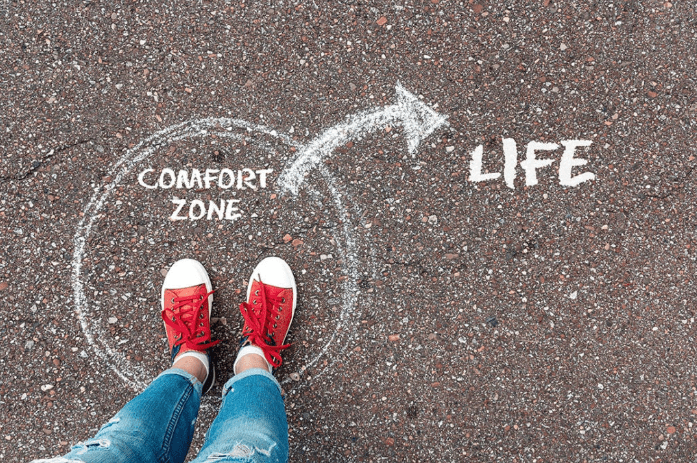
The human race enjoys doing the same things repeatedly. We love to keep ourselves busy all day and seldom think of what we would do if given a choice to shape our day differently. And that is how we slowly get trapped in our so-called “Comfort zone”, which creates an invisible boundary of perception about ourselves, thoughts, and actions.
Psychologists say that a comfort zone is a personal mind space where an individual defines a set of routine tasks, activities, interests, a do and don’ts list, boundaries, and a willingness to accept the risks.
Everyone has their comfort zones and their understanding about it makes it easy or difficult for them to manage. They are not static in nature, they are dynamic and keep shifting from time to time based on the individual’s age, experiences, motives, social influences, and personal priorities. They fulfill our safety and security needs and that is why we are easily trapped in them.
How do we recognize our comfort zone?
Comfort zones are embedded within us in unique ways. In principle, they are not bad at all. They define us and our experiences and our skills inventory. They give us confidence, assurance, and relaxation. This is the premise on which I encourage people to expand their boundaries.
Comfort zones are subjective, hence you will experience them based on your personality, culture, personal and family values. How shall we identify our comfort zones?

Here are some thoughts that can help you identify your boundaries:
1. A feeling of satisfaction and complacency in your personal and work life. A positive feeling that you have achieved success and thus you don’t feel the need to challenge yourself further.
2. Having a strong public presence and being a top-ranked influencer in your social circle. You do not see the need to expand your zone.
3. You avoid repeating situations or circumstances because they have been unpleasant experiences in the past.
4. The mental blocks that hinder you from learning new skills.
5. Your personality and natural self. You may feel energized to start something new in the beginning, but midway boredom sets in, and you lose interest.
6. Your inventory of fears, failures, appetite to accept risk, do’s and don’ts.
Understanding your comfort zone is important as it will help you to decide on whether to push your boundaries or keep it at its current level. If you choose to enlarge your boundaries, you are opening the door of possibilities for yourself!
You may decide to grow any part of your comfort zone viz. personal, professional, family, spiritual, or community welfare.

What happens when we push our boundaries?
The decision to move beyond the comfort zone and tap the growth zone is personal. Every day each of us is making a powerful choice to expand it or keep it the way it is. The moment we step out of our boundaries we are vulnerable to experience the unknown. This unknown may raise our feeling of discomfort, challenge us to strengthen our mental stamina and we may need to revisit the pains to change. However, once you overcome them, you starting enjoying the game, improving your performance, and keep growing your boundaries inch by inch!
The expanded comfort zone will unleash your potential and make you a youthful, confident, and stronger version of yourself. Once you get into the habit of expanding your boundaries you keep progressing, rejuvenating, experimenting, and creating moments of life.
Let us step out of our comfort zone and experience the magic of possibilities.
Happy reading and stay safe.
A comfort zone is a personal mind space where an individual defines a set of routine tasks, activities, interests, a do and don’ts list, boundaries, and a willingness to accept the risks.
Not at all. Comfort zones are a great thing. They define us and our experiences and our skills inventory. They give us confidence, assurance, and relaxation.
Stepping out of your comfort zone means pushing your boundaries, and experiencing new things without thinking of the outcome.
Comfort zone feel dangerous because the moment we step out of our boundaries we are vulnerable to experience the unknown. This unknown may raise our feeling of discomfort, challenge us to strengthen our mental stamina and we may need to revisit the pains to change.
